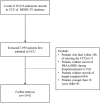Effects of Stress Hyperglycemia on Short-Term Prognosis of Patients Without Diabetes Mellitus in Coronary Care Unit
- PMID: 34095265
- PMCID: PMC8169960
- DOI: 10.3389/fcvm.2021.683932
Effects of Stress Hyperglycemia on Short-Term Prognosis of Patients Without Diabetes Mellitus in Coronary Care Unit
Abstract
Background: Diabetes mellitus (DM) has a high morbidity and mortality worldwide, and it is a risk factor for cardiovascular diseases. Non-diabetic stress hyperglycemia is common in severely ill patients, and it could affect prognosis. This study aimed to analyze the influence of different blood glucose levels on prognosis from the perspective of stress hyperglycemia by comparing them with normal blood glucose levels and those of patients with DM. Methods: A retrospective study of 1,401 patients in coronary care unit (CCU) from the critical care database called Medical Information Mart for Intensive Care IV was performed. Patients were assigned to the following groups 1-4 based on their history of DM, random blood glucose, and HbA1c levels: normal blood glucose group, moderate stress hyperglycemia group, severe stress hyperglycemia group and DM group. The main outcome of this study was 30- and 90-day mortality rates. The associations between groups and outcomes were analyzed using Kaplan-Meier survival analysis, Cox proportional hazard regression model and competing risk regression model. Results: A total of 1,401 patients in CCU were enrolled in this study. The Kaplan-Meier survival curve showed that group 1 had a higher survival probability than groups 3 and 4 in terms of 30- and 90-day mortalities. After controlling the potential confounders in Cox regression, groups 3 and 4 had a statistically significant higher risk of both mortalities than group 1, while no difference in mortality risk was found between groups 2 and 1. The hazard ratios [95% confidence interval (CI)] of 30- and 90-day mortality rates for group 3 were 2.77(1.39,5.54) and 2.59(1.31,5.12), respectively, while those for group 4 were 1.92(1.08,3.40) and 1.94(1.11,3.37), respectively. Conclusions: Severe stress hyperglycemia (≥200 mg/dL) in patients without DM in CCU may increase the risk of short-term death, which is greater than the prognostic effect in patients with diabetes. Patients with normal blood glucose levels and moderate stress hyperglycemia (140 mg/dL ≤ RBG <200 mg/dL) had no effect on short-term outcomes in patients with CCU.
Keywords: CCU; diabetes; insulin resistance; short-term prognosis; stress hyperglycemia.
Copyright © 2021 Zhang, Wang, Xu, Han, Li, Yin and Lyu.
Conflict of interest statement
The authors declare that the research was conducted in the absence of any commercial or financial relationships that could be construed as a potential conflict of interest.
Figures



Similar articles
-
Association between hyperglycemia and adverse clinical outcomes of sepsis patients with diabetes.Front Endocrinol (Lausanne). 2023 Jan 9;13:1046736. doi: 10.3389/fendo.2022.1046736. eCollection 2022. Front Endocrinol (Lausanne). 2023. PMID: 36699043 Free PMC article.
-
Association of Diabetes and Admission Blood Glucose Levels with Short-Term Outcomes in Patients with Critical Illnesses.J Inflamm Res. 2020 Dec 22;13:1151-1166. doi: 10.2147/JIR.S287510. eCollection 2020. J Inflamm Res. 2020. PMID: 33376380 Free PMC article.
-
The stress hyperglycemia ratio, a novel index of relative hyperglycemia, predicts short-term mortality in critically ill patients after esophagectomy.J Gastrointest Oncol. 2022 Feb;13(1):56-66. doi: 10.21037/jgo-22-11. J Gastrointest Oncol. 2022. PMID: 35284100 Free PMC article.
-
Proposal of a New Approach to Study and Categorize Stress Hyperglycemia in Acute Myocardial Infarction.J Emerg Med. 2016 Jul;51(1):31-6. doi: 10.1016/j.jemermed.2015.03.047. Epub 2016 Mar 31. J Emerg Med. 2016. PMID: 27041491 Review.
-
Perioperative diabetic and hyperglycemic management issues.Crit Care Med. 2004 Apr;32(4 Suppl):S116-25. doi: 10.1097/01.ccm.0000115623.52021.c0. Crit Care Med. 2004. PMID: 15064670 Review.
Cited by
-
Association between stress hyperglycemia ratio and delirium in older hospitalized patients: a cohort study.BMC Geriatr. 2022 Apr 4;22(1):277. doi: 10.1186/s12877-022-02935-6. BMC Geriatr. 2022. PMID: 35369877 Free PMC article.
-
Predicting acute kidney injury risk in acute myocardial infarction patients: An artificial intelligence model using medical information mart for intensive care databases.Front Cardiovasc Med. 2022 Sep 7;9:964894. doi: 10.3389/fcvm.2022.964894. eCollection 2022. Front Cardiovasc Med. 2022. PMID: 36158815 Free PMC article.
-
Prognostic implications of stress hyperglycemia ratio in patients with myocardial infarction with nonobstructive coronary arteries.Ann Med. 2023 Dec;55(1):990-999. doi: 10.1080/07853890.2023.2186479. Ann Med. 2023. PMID: 36896774 Free PMC article.
-
GLUCOSE AND SODIUM LEVELS AS DISEASE OUTCOME PREDICTORS IN CRITICALLY ILL PATIENTS.Acta Clin Croat. 2023 Nov;62(3):510-518. doi: 10.20471/acc.2023.62.03.13. Acta Clin Croat. 2023. PMID: 39310689 Free PMC article.
-
Serum glucose-potassium ratio predicts inhospital mortality in patients admitted to coronary care unit.Rev Assoc Med Bras (1992). 2024 Oct 7;70(10):e20240508. doi: 10.1590/1806-9282.20240508. eCollection 2024. Rev Assoc Med Bras (1992). 2024. PMID: 39383392 Free PMC article.
References
LinkOut - more resources
Full Text Sources

